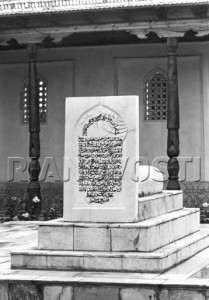The great Naqshbandi shaykh and student of Khwaja Baha al-Din Naqshband, Hazrat Mawlana Yaqub Charkhi (762-851 AH) was not only a Sufi master but also a reputed Islamic scholar.
His full name was Yaqūb bin Usmān bin Mahmūd Ghaznavi Charkhi. He was born around 762 AH (1360/61) and passed away to the eternal world on Saturday 5 Safar 851 AH (22 April 1447). His shrine, according to some research scholars, lies 5 kilometers West of Dushanbe the capital of Tajikistan.
He was a direct disciple of the founder of the Naqshbandi tariqah, Khwājā Muhammad Bahā’uddīn Naqshband Bukhārī, and had also received khilafah from him. However, after the shaykh’s demise, he also benefited from the spiritual blessings of Khwājā Alā’uddīn Attār who was the spiritual successor of Khwaja Naqshband.
His son Maulana Yūsuf Charkhi was also a great Sufi. However his chief successor was Khwaja Ubayd-Allah Ahrār (806-895 AH).
One day Maulana Yaqūb asked his student Khwaja Ahrar that I have heard that Shaykh Zain ad-Dīn Khwāfī (one of his earlier colleagues) does interpretations of dreams and (spiritual) visions. Is that true? Khwaja Ahrar replied, “Yes my master, its true”. Then he went into a state of unconsciousness. Later he raised his head and recited following verses.
چون غلام آفتابم همه از آفتاب گويم، نه شبم نه شب پرستم که حديث خواب گويم
(As I am a servant of the sun, I speak all of the sun. I am neither night nor a night-worshiper that I talk of dream stories.) (rough translation)
He wrote some books and short treatises (risalah), listed here:
1. Tafsir Yaqoob Charkhi (Persian)
تفسير يعقوب چرخي
This is a Tafsīr (exegesis) of the first chapter Fateha and the last two Ajza of the Holy Quran. Completed in 851 AH (1447), it has been published multiple times. First published probably in 1891 in Lucknow, the recent Farsi edition was published in 2004 by Ar-Rahim Academy, Azam-nagar, Karachi.
A number of Urdu translations are also published, most recently by Zia-ul-Quran Publications Lahore which is also available on maktabah.org. Another translation with research notes was done by Muhammad Nazir Ranjha and published in 2005. It is available here.
2. Risalah Na’iyah (رساله نائيه)
This is a commentary over the preface of Masnavi, the great book of Persian poetry by Mawlana Jalaluddin Rumi. The Farsi edition was first published in 1336 AH by Anjuman-e Tarikh-e Afghanistan, Kabul. Its Urdu translation by Muhammad Nazir Ranjha was published in 1978 by Islamic Book Foundation Lahore, second edition was published in 2004.
3. Risalah Unsiyyah (رساله اُنسيه)
This contains merits of keeping Wuzu at all times, merits of Zikr al-Khafi according to the Naqshbandi method, merits of Nawāfil, and some quotes (sayings) of Khwaja Bahauddin Naqshband and Khwaja Ala’uddin Attar, may Allah be pleased with them. Its Urdu translation by Muhammad Nazir Ranjha, accompanied with the original Persian text, is published and available atmaktabah.org. It is also included in the book Risāil Hazrat Mawlānā Ya’qūbCharkhī published by Ranjha in 2009. Another Urdu translation by Iqbal Ahmad Faruqi is published in a collection of Naqshbandi writings and is available here.
4. Sharah Rubai Abu Saeed Abu al-Khair, aka Jamāliah or Hūrāiya
شرح رباعي ابو سعيد ابي الخير، جماليه، حورائيه
This manuscript is kept in the Markaz Tahqīqāt Fārsi Iran wa Pakistan (Center for Persian Research in Iran and Pakistan). This is a commentary of a poem of Shaykh Abu Saeed Abu al-Khair. This was published in a magazine, and its Urdu translation was done by Muhammad Nazeer Ranjha and included in the book Seh Risail Hazrat Maulana Yaqūb Charkhi (three writings of Maulana Yaqub Charkhi), published in 1998 by Akhlāq Ahmad Academy, Lahore. Farsi text with Urdu translation are included in Risāil Hazrat Mawlānā Ya’qūb Charkhī published by Ranjha in 2009.
5. Risalah Abdaliah (رساله ابداليه)
Written in Farsi, this is a description of the existence of saints and their spiritual posts. Persian edition was published in June 1978 with research by Muhammad Nazeer Ranjha, and its Urdu translation by Ranjha was also published in the same year by Islamic Book Foundation Lahore. Farsi text with Urdu translation are included in Risāil Hazrat Mawlānā Ya’qūb Charkhī published by Ranjha in 2009.
6. Sharh Asma-Allah (شرح اسماء الحسنیٰ)
This contains benefits and merits of the blessed Names of Allah (Asmā-Allah). Handwritten manuscripts are available in some libraries but publication is not known. However its Urdu translation by Muhammad Nazir Ranjha was published in 1995 from Lahore. Farsi text with Urdu translation are included in Risāil Hazrat Mawlānā Ya’qūb Charkhī published by Ranjha in 2009.
7. Tariqah Khatm Ahzab (طريقه ختم احزاب)
Khwaja Yaqub Charkhi wrote this treatise on the method of reciting the complete Holy Quran, narrating from Hāfiz ad-Dīn Bukhārī. Its Farsi text and Urdu translation by Muhammad Nazeer Ranjha has been published in 1998 by Akhlaq Ahmad Academy, Lahore, included in the book Seh Risail Hazrat Maulana Yaqūb Charkhi (three writings of Maulana Yaqub Charkhi). Farsi text with Urdu translation are included in Risāil Hazrat Mawlānā Ya’qūb Charkhī published by Ranjha in 2009.
8. Risalah about signs of Qiyamah (رساله درباره اصحاب و علامات قيامت)
A manuscript of this Farsi article is known to exist in Tashkent and Tehran, with some damage to starting pages.
9. Translation of Holy Quran into Tajik
Some newspapers reported (in 1982) that a Tajik translation of the Holy Quran was published in Soviet Tajikistan, done by Mawlana Yaqub Charkhi. This has not been verified through any reliable source.
The next in the Naqshbandī Mujaddidī Tāhirī spiritual golden chain is Khwaja Ubaid-Allah Ahrar.
